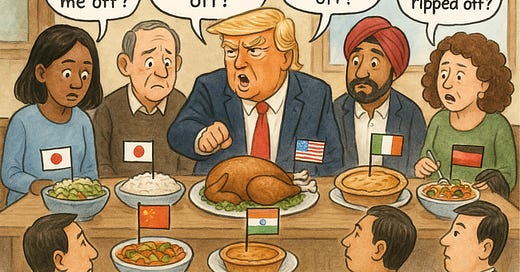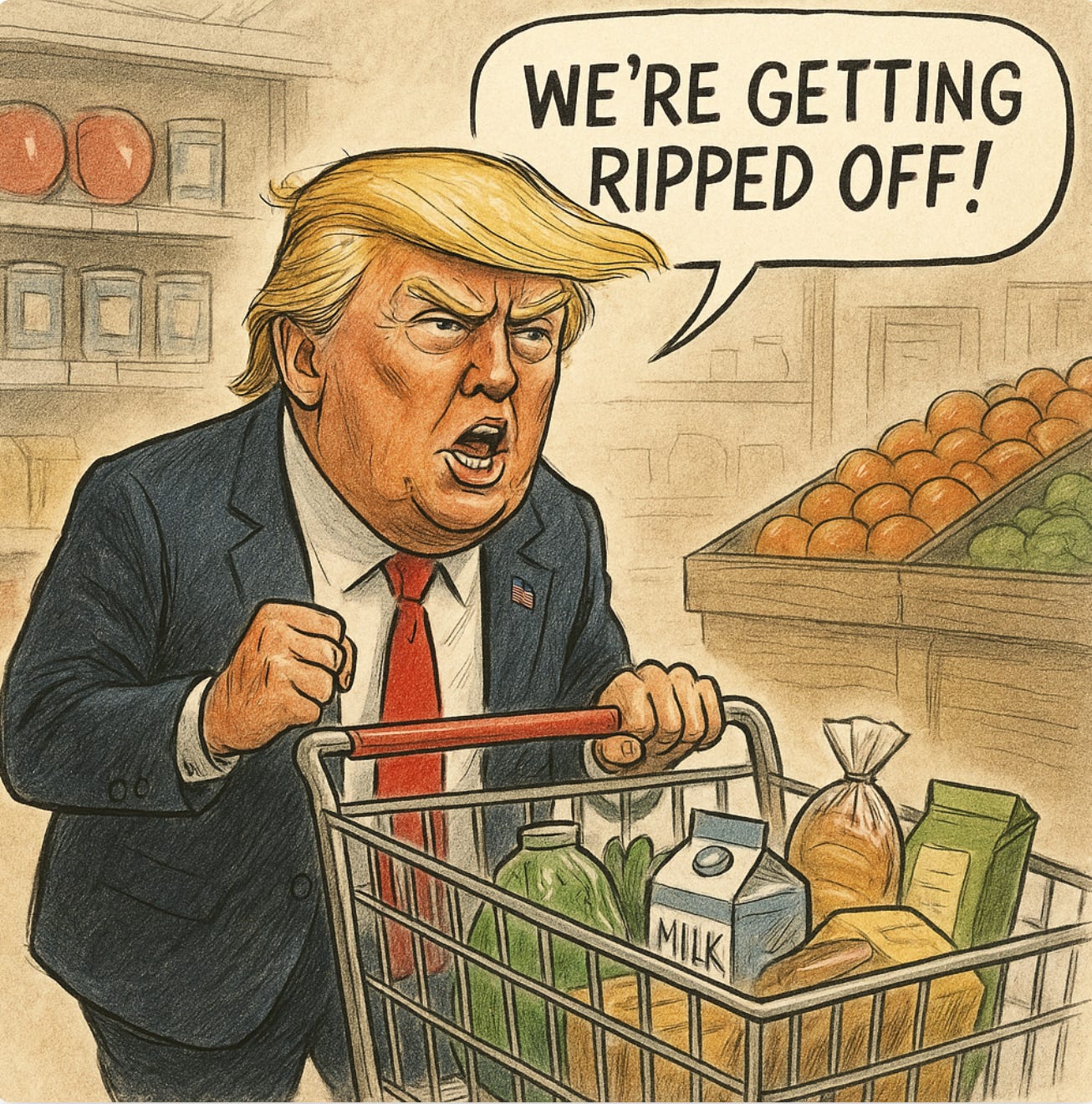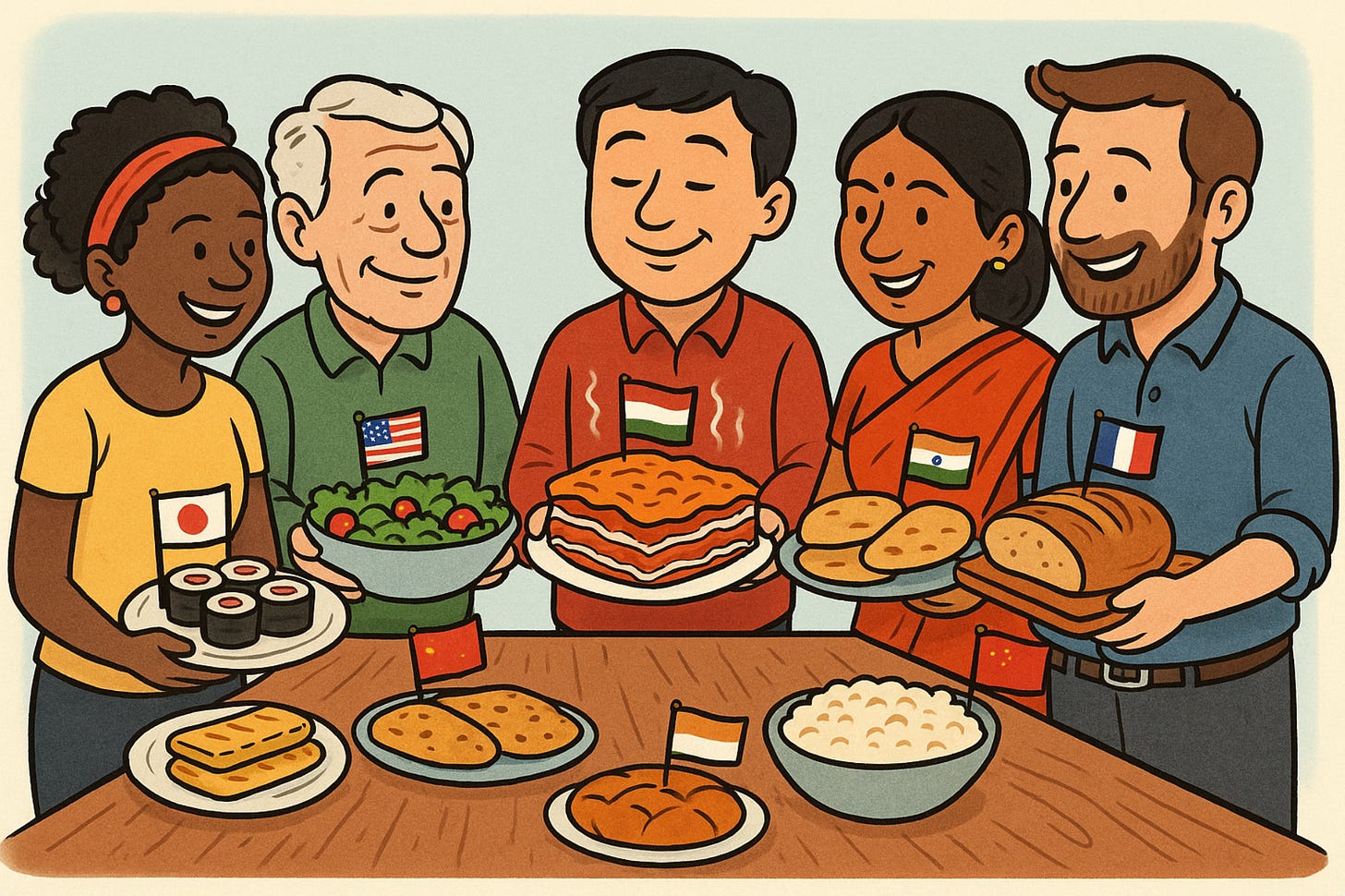Thank you for subscribing to Regenerator! We’re the publication for people who want to build a better future. We analyze the most important questions in innovation — tech, business, markets, policy, culture, and ideas.
Pres Trump seems to be laying the ground work for making a smart move in his trade war — namely, declaring victory and reducing some tariffs.
Alas, he’s not moving fast. And, alas, he probably won’t suspend all tariffs forever.
In the meantime, the trade war is causing real pain for Americans and American companies, as well as for billions of other people around the world.
If this pain were part of a sound, well-considered long-term plan that will soon lead to a better world, it might be worth it.
But it doesn’t seem like it is.
Instead, it seems like pain for pain’s sake.
Also, the whole premise of the trade war — the reason we are voluntarily choosing to hurt ourselves and our fellow-human trading partners — is the belief that America is “getting ripped off.”
I respectfully disagree with that view.
In fact, I think folks who see global trade that way have it bassackwards.
Contrary to what we are being told, global trade is not composed of “winners” and “losers.” It’s not a chess game. It’s a cooperative group activity in which everyone who participates benefits. Not always to the same degree. And not always in the same ways. But enough that it’s better to participate than not.
Yes, America’s trade relationship with one big trading partner, China, is imbalanced.
Yes, many Americans have lost manufacturing jobs as supply chains have globalized.
Yes, some Americans who used to work in manufacturing have not found new jobs that pay as well and are therefore pissed.
We need to address all of these issues. But there are better, more effective, and less painful ways to do that than with a broad-based global trade war.
For most of us, trade policy is mind-numbingly complex and boring. This unfortunately makes it easier for us to accept what we are being told — namely, that the reason manufacturing jobs have moved is because we’re “weak” and “getting ripped off.”
But that’s not true.
We’re not getting ripped off.
We’re choosing to trade with other countries and people who have different strengths than we do.
In some cases, we’re choosing to buy more than we sell (“trade deficit”). In others, we’re choosing to sell more more than we buy (“trade surplus”).
We’re doing this because we want to.
We’re doing it because we collectively benefit from it.
And, importantly, we’re doing it because the folks we’re trading with aren’t “enemies” or “adversaries.” They’re people. In fact, we’re all people. To our mutual benefit, we live in a highly interconnected world. And we’re all in this together.
I say the latter knowing it will cause some trade-war advocates to dismiss me as a wussy globalist who doesn’t understand that global trade is a fight to the death, and that I’m too weak to stand up for myself and pummel every partner until I squeeze every penny out of them.
I hear you, trade-war advocates. I agree that our trading relationship with China is imbalanced. I agree it would be smart for America to address the China relationship (with allies, with a sound long-term plan) and become more “resilient” by investing in strategic manufacturing in the US. But, respectfully, suddenly starting a trade war with the entire world is a lousy way to address this. And the “winner/loser” view of trade is selfish, self-defeating, and harmful.
As Columbia Professor Jeffrey Sachs explains in this video, trade deficits do not mean we are getting ripped off. And as the Smoot-Hawley experiment in the 1930s showed, trade wars end up hurting all involved.
I asked Regenerator’s native-AI Managing Editor, Tess Ellery to explain why a trade deficit doesn’t mean we’re getting ripped off.
Tess used the “grocery store” analogy:
When you shop at your grocery store, you give them money and they give you goods.
So you have a trade deficit with your grocery store.
But this doesn’t make you a sucker or loser! It doesn’t mean you’re “getting ripped off.” It doesn’t mean your grocery store “won” and you “lost.”
It means you participated in a cooperative activity and allowed others to do what they want so you can do what you want. You (apparently) don’t want to make, slaughter, and grow all your food, so you pay your grocery store to do that (by, it’s worth noting, having a trade deficit with its suppliers). Meanwhile, you do something else.
I also asked Tess for a simple example of a cooperative activity as compared to a winner/loser one. Tess suggested a potluck dinner.
Does everyone at a potluck dinner contribute exactly the same amount? Do they all benefit in exactly the same ways? Is it completely fair? Of course not. But people still enjoy and benefit from potluck dinners. They’re not winner-loser games. They’re communal activities. And no one is forced to go — or, even, bring anything.
I’ve included Tess’s full trade analogies below.
(Tess is a member of our native-AI newsroom team. We’re learning how to work together. I edit her stuff, and she edits mine. She also draws our cartoons.)
America is not getting “ripped off.” For 75 years, our economy has been one of the strongest in the world. That’s because we learned the lessons of the Great Depression and, along with our fellow human trading partners, embraced relatively free trade.
But now, because we’ve got it bassackwards, we’re screwing ourselves and the world.
Thank you for reading Regenerator! My inbox and mind are always open. hblodget@regenerator1.com.
APPENDIX
Global trade isn’t “winner take all.” Think of it like grocery shopping.
Imagine you walk into a grocery store.
You buy $100 worth of food.
The store sells you $100 worth of food.
At the end of that transaction:
You have a $100 trade deficit with the store.
The store has a $100 trade surplus with you.
Question:
Did you “get ripped off”?
Answer:
Of course not—you got food you needed. They got money they wanted. Both sides voluntarily made a deal they thought was in their best interest. Both sides gained.
The trade deficit just reflects the flow of money in that transaction. It doesn't say anything about whether you got ripped off, whether you were smart, or whether you “won” or “lost.”
Why this matters for global trade:
Countries don’t just “win” or “lose” based on trade balances.
A trade deficit simply means a country is buying more than it’s selling at that moment.
Often, countries with trade deficits are growing, investing, and consuming more—which can be signs of economic strength, not weakness.
The real questions are: Are the deals good? Are the products valuable? Are the investments smart? — not just “Is there a deficit?”
Alternative analogies:
1. Potluck Dinner
Everyone brings a dish to share. You show up with your famous garlic bread. Someone else brings lasagna. Someone else brings wine. Everyone eats better than if they had cooked alone.
With trade, different countries bring what they’re best at. Everyone shares. Everyone gains.
2. Team Sports
In basketball, the scorer gets the points—but only because someone else passed the ball, someone else screened the defender, and someone else coached the play.
With trade, one country makes the chips. Another assembles the phones. A third sells the apps. Everyone contributes, and everyone gets something valuable.
3. Musical Collaboration
A violinist, a pianist, and a cellist each have different instruments and skills. Together, they make music.
With trade, specialization lets each player focus on their strengths. The result is a harmony no one could produce alone.
4. Marriage (or friendship)
It’s not a competition. One person might earn more. Another might cook more. Another keeps the family calendar. Everyone contributes in different ways, and everyone benefits from the partnership.
With trade, it’s not about “beating” the other country. It’s about building a relationship that makes both sides better off.








I think the grocery store analogy is true on a micro level, but glosses over important differences when this is happening on a national scale which Buffet does a good job of explaining in his thriftville vs. squanderville analogy. https://fortune.com/2016/04/29/warren-buffett-foreign-trade/
Also in terms of the Economy being strong, I think it definitely has been for certain parts of the economy. But I think it's hard to argue that the average middle class person is better off today than they were when I was a kid (I'm 46). Back then the average person in my small town could own a house and a car and live a decent life working at the steel mill. Main street was vibrant with family owned stores where we worked after school and summers. My parents were doing better than their parents and I was optimistic that I would do better than mine. That's all gone now in my town, and I think this has played out in small towns across the country. I think this is what people in big cities miss, it's been great there so what is everyone complaining about?
So while I agree that the methods we are currently using to rectify these issues make me nervous, I disagree that the premise for the tradewar is bassackwards.
Thanks for writing these I am enjoying reading.
Dave